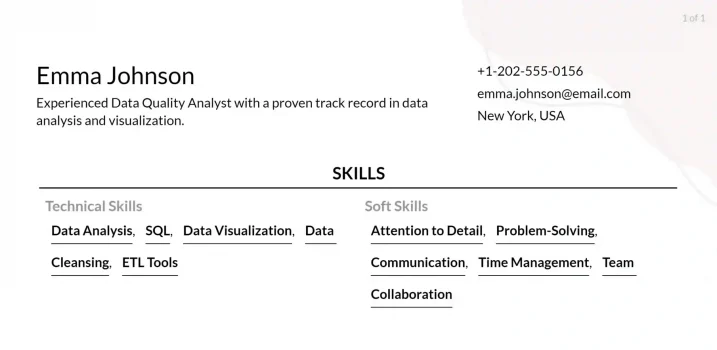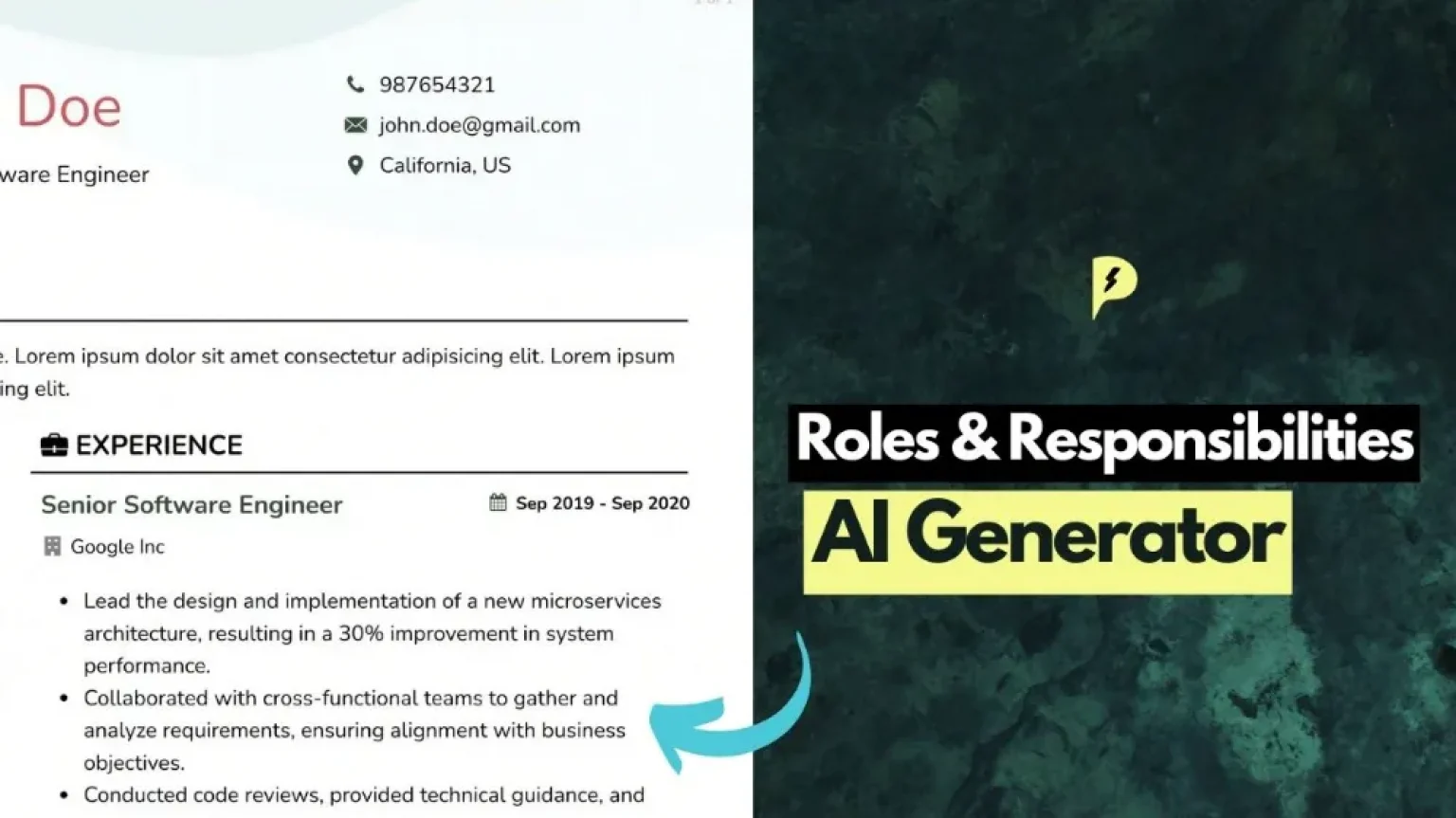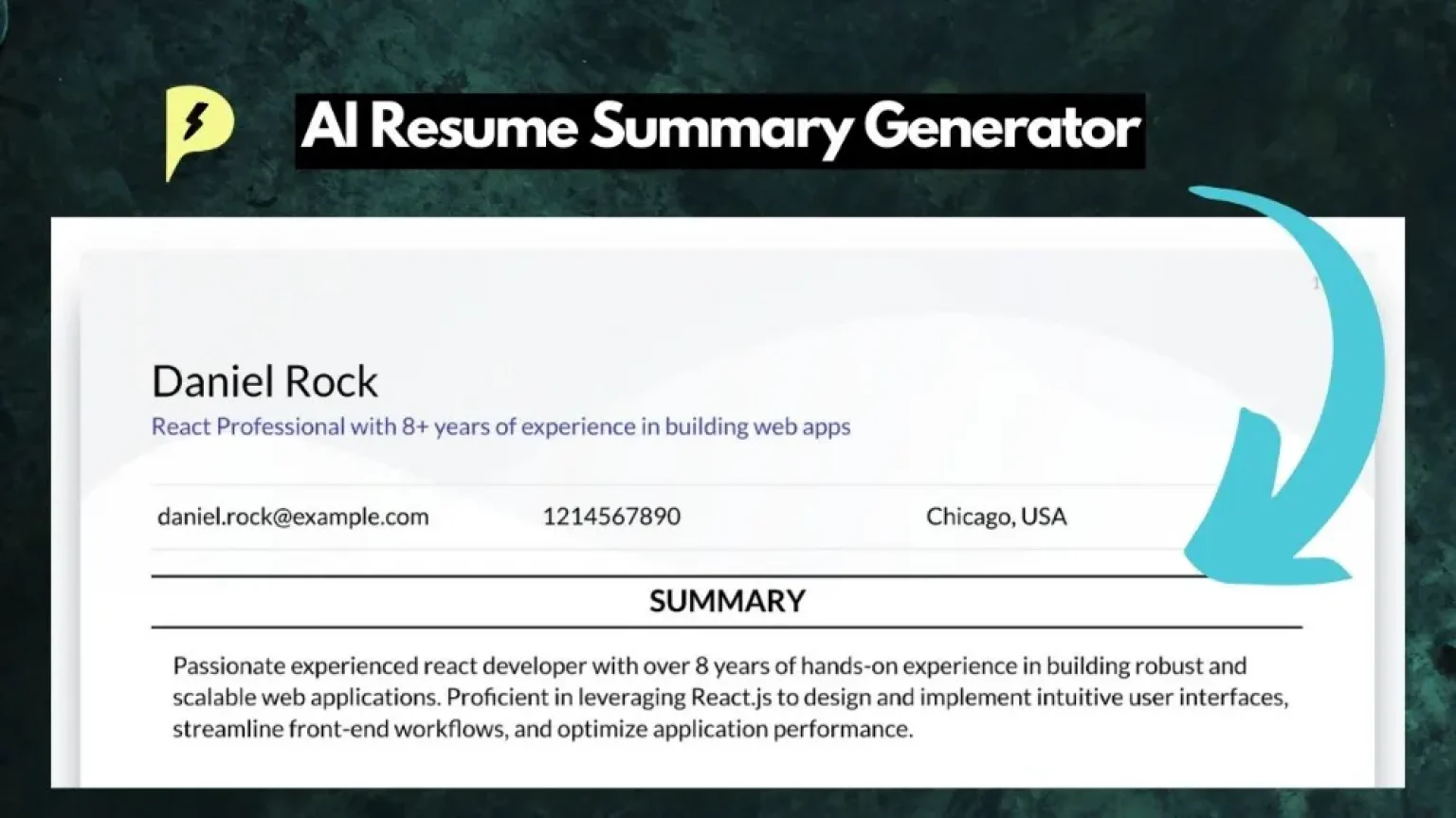To craft a standout resume for a Data Quality Analyst role, it’s important to balance technical expertise and essential soft skills. From mastering data analysis and SQL to showcasing your attention to detail and communication skills, each element plays a crucial role in your job application. Let’s break down how these skills can make a difference whether you’re just starting out or bringing years of experience to the table.
Required Data Quality Analyst Skills To Put On Resume
For a Data Quality Analyst, there are several key hard and soft skills that can set you apart. Hard skills like data analysis, SQL, and data visualization are non-negotiable, while soft skills such as problem-solving and team collaboration are equally vital. Together, these skills demonstrate your ability to handle data accurately and work effectively within a team. Below listed are some of the definitely needed Data Quality Analyst skills to put on resume for all levels in this role.
Hard Skills
- Data Analysis
- SQL
- Data Visualization
- Data Cleansing
- ETL Tools
- Data Analysis: Essential for interpreting and making sense of data patterns.
- SQL: Fundamental for querying databases to extract and manipulate data.
- Data Visualization: Important for presenting data insights through charts and graphs.
- Data Cleansing: Necessary to ensure data accuracy and reliability.
- ETL Tools: Crucial for extracting, transforming, and loading data efficiently.
Soft Skills
- Attention to Detail
- Problem-Solving
- Communication
- Time Management
- Team Collaboration
- Attention to Detail: Ensures data accuracy and helps identify inconsistencies.
- Problem-Solving: Critical for addressing data issues and finding solutions.
- Communication: Important for explaining data insights to non-technical stakeholders.
- Time Management: Helps in managing multiple tasks and meeting deadlines.
- Team Collaboration: Vital for working effectively with other team members.
Copy Above Data Quality Analyst Resume Example and Paste in resume builder
Fresher Data Quality Analyst: Good To Have
For entry-level Data Quality Analysts, highlighting specific skills can make your resume shine. Basic Excel skills, data entry, and a foundational understanding of database management can show potential employers you’re ready to hit the ground running. Soft skills like adaptability and curiosity further emphasize your willingness to learn and grow in the role. Below listed are some of the good to have fresher Data Quality Analyst skills to put on resume along with must have skills.
Hard Skills
- Basic Excel Skills
- Data Entry
- Database Management
- Reporting Tools
- Basic Programming (Python, R)
- Basic Excel Skills: Useful for handling and analyzing data in spreadsheets.
- Data Entry: Important for accurately inputting data into systems.
- Database Management: Helps in understanding how databases work.
- Reporting Tools: Assists in generating and presenting data reports.
- Basic Programming (Python, R): Beneficial for automating data tasks and analysis.
Soft Skills
- Adaptability
- Curiosity
- Analytical Thinking
- Organizational Skills
- Basic Project Management
- Adaptability: Key for adjusting to new tools and methods quickly.
- Curiosity: Drives continuous learning and improvement.
- Analytical Thinking: Crucial for breaking down complex data problems.
- Organizational Skills: Important for managing and prioritizing tasks.
- Basic Project Management: Helps in coordinating tasks and meeting project goals.
Copy Above Data Quality Analyst Resume Example and Paste in resume builder
Experienced Data Quality Analyst: Good To Have
If you’re an experienced Data Quality Analyst, showcasing advanced skills is key. Proficiency in advanced SQL, data governance, and big data tools like Hadoop and Spark can highlight your technical expertise. Additionally, soft skills such as leadership and strategic thinking can demonstrate your ability to guide teams and align data strategies with business goals. Below listed are some of the good to have senior Data Quality Analyst skills to put on resume along with must have skills.
Hard Skills
- Advanced SQL
- Data Governance
- Data Modeling
- Big Data Tools (Hadoop, Spark)
- Machine Learning
- Advanced SQL: Essential for complex data querying and manipulation.
- Data Governance: Important for establishing data policies and standards.
- Data Modeling: Crucial for designing and maintaining data architecture.
- Big Data Tools (Hadoop, Spark): Useful for handling large datasets efficiently.
- Machine Learning: Beneficial for implementing predictive analytics and automating data processes.
Soft Skills
- Leadership
- Strategic Thinking
- Mentoring
- Conflict Resolution
- Stakeholder Management
- Leadership: Vital for guiding and inspiring teams.
- Strategic Thinking: Important for aligning data strategies with business goals.
- Mentoring: Helps in developing junior analysts and fostering team growth.
- Conflict Resolution: Essential for resolving disagreements and maintaining team harmony.
- Stakeholder Management: Crucial for managing relationships with key stakeholders.
Copy Above Data Quality Analyst Resume Example and Paste in resume builder
DO’s & Don’ts For Data Quality Analyst Skills In Resume
- Highlight relevant technical skills like SQL and data analysis.
- Showcase your ability to work with data visualization tools.
- Emphasize attention to detail in your past projects.
- Demonstrate problem-solving abilities with examples.
- Include soft skills like communication and teamwork.
- Don’t list skills that aren’t relevant to the role.
- Avoid generic statements without specific examples.
- Don’t forget to proofread for accuracy and clarity.
- Avoid overcrowding your resume with too much information.
- Don’t ignore the importance of soft skills.
FAQ’s For Data Quality Analyst Skills In Resume
What are the most important skills for a Data Quality Analyst?
Key skills include data analysis, SQL, data visualization, attention to detail, and problem-solving.
How can I showcase my Data Quality Analyst skills on my resume?
Highlight your technical skills, provide examples of your work, and emphasize soft skills like communication and teamwork.
What skills are beneficial for entry-level Data Quality Analysts?
Basic Excel skills, data entry, database management, and soft skills like adaptability and curiosity are beneficial.
What advanced skills should experienced Data Quality Analysts include on their resume?
Advanced SQL, data governance, data modeling, big data tools, and leadership skills should be included.
Why are soft skills important for a Data Quality Analyst?
Soft skills like communication and problem-solving are crucial for working effectively in teams and addressing data-related issues.
Conclusion
Adding relevant Data Quality Analyst skills to your resume can significantly boost your chances of landing the job, whether you’re just starting or have years of experience. These skills not only show your technical proficiency but also your ability to collaborate and solve problems effectively. For a polished, impactful resume, visit placements.app resume builder to create your free resume today.



